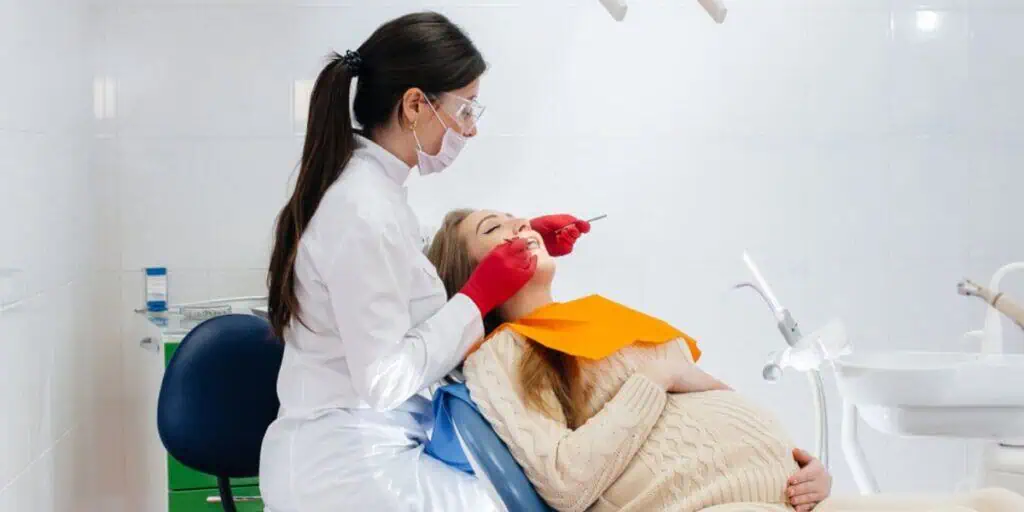The American Dental Association considers preventive dental cleanings and treatment of oral health conditions to be safe throughout pregnancy. Reassuringly, The American College of Obstetricians and Gynecologists actually recommends that women continue to receive dental care when pregnant, as it results in better health outcomes for the mother and reduces the risk of harmful bacteria being transmitted to their newborn child.

And it’s not just oral health problems that require immediate dental treatment, such as extractions, root canals, or fillings, that are safe. Any necessary dentistry is safe at any time during pregnancy, but elective cosmetic procedures should be delayed until after the birth of your child.
From a comfort point of view, the first and second trimesters are the ideal time for dental work, as by the time you reach the third, you may find lying on your back for a long time difficult.
It’s best to have your dental health evaluated before becoming pregnant and continue to practice good dental hygiene, including brushing with fluoride toothpaste twice daily and flossing at least once daily.
Does pregnancy affect my dental health?
Pregnancy is an exciting, dynamic time with many changes to your body and preparations for your baby’s arrival. Practicing good self-care is critical for your health and that of your child, and this includes looking after your dental health.
The changes in your body and lifestyle that could lead to serious dental problems include:
Hormonal changes
When pregnant, your body produces more estrogen and progesterone, which can inflame the gums. Due to this inflammation, you may experience sensitive, swollen, or bleeding gums, known as pregnancy gingivitis. Without proper care, gingivitis can worsen and eventually lead to the serious gum disease otherwise known as periodontal disease.
Changes in daily routine
It’s hardly surprising that getting enough sleep can be difficult when you’re pregnant, and if all you want is to fall into bed, you may occasionally forget to brush or floss your teeth. You can do a few things to improve your sleep, and if you’re not as fatigued, you’re less likely to forget your dental health routine.
Changes in eating habits
You may develop cravings for or aversions to foods when pregnant, making maintaining a balanced diet difficult. Sugary snacks are known to be bad for your teeth, so try and snack on healthier treats.
Morning sickness
If you have bad morning sickness, vomiting exposes your teeth to stomach acid, which can wear away the tooth enamel. If not treated, this may result in tooth decay or loss.
However, dental healthcare providers recommend NO toothbrushing immediately after vomiting, as this spreads stomach acid further. Instead, use a mouth rinse made up of a cup of water and a teaspoon of baking soda to neutralize the acid.
Pregnancy tumor
Although not cancerous, these tumors bleed easily and appear red and raw. Several factors can lead to these forming, including poor dental hygiene and elevated hormone levels.
Does maternal oral health affect pregnancy outcomes?
Several studies, including those published in journals like The Journal of the American Dental Association, have indicated that pregnant women with chronic gum disease may be at an increased risk of pre-term delivery. The inflammation and infection associated with periodontal disease are thought to play a role in triggering processes that might lead to pre-term labor.
If you don’t practice good dental hygiene when pregnant, the increased bacteria in your mouth could pass to your bloodstream, triggering the production of prostaglandins, chemicals that may induce pre-term labor.
Although study results have been mixed, a recent systematic review found that there is an association between periodontitis and adverse pregnancy outcomes, including:
- pre-term birth
- low birth weight premature babies
- preeclampsia
The study concluded that periodontal therapy reduces adverse pregnancy outcomes from periodontitis.
The American Academy of Pediatrics encourages continued dental care during pregnancy, as periodontal disease can affect your child’s teeth in the future.
Can I get a dental X-ray while pregnant?
X-rays are routine in dental visits, and the FDA, the American Dental Association, the American College of Obstetricians and Gynecologists, and the American College of Radiology all agree that X-rays are safe. They agree that dental X-rays, even in the first trimester, don’t put the fetus at risk but advise using shields to protect the reproductive organs.
Is anesthesia safe during pregnancy?
Local anesthetics, such as lidocaine, are safe during pregnancy. However, nitrous oxide and general anesthesia are not recommended, and the latter could lead to miscarriage.
Can I undergo elective dental procedures while pregnant?
The American Dental Association advises that elective procedures should be scheduled during your second trimester or early in the third trimester. Any major surgeries should wait until after you have your baby.
If your dentist would like to use anesthesia or prescribe antibiotics or pain medications, he or she may require your OB-GYN to provide a note approving their use.
Make Dr. Thaïs Aliabadi your Los Angeles OB/GYN
An expert in obstetrics and gynecology, Dr. Aliabadi has been a practicing OB/GYN in Los Angeles since 2002. She serves as the official gynecologist to many royal families and celebrities and instructs Cedars Sinai Medical Center residents and medical students at the University of Southern California.
We invite you to establish care with Dr. Aliabadi. Please make an appointment online or call us at (844) 863-6700.
Dr. Aliabadi’s practice and the Outpatient Hysterectomy Center are conveniently located for patients throughout Southern California and the Los Angeles area. We are near Beverly Hills, West Hollywood, Santa Monica, West Los Angeles, Culver City, Hollywood, Venice, Marina del Rey, Malibu, Manhattan Beach, and downtown Los Angeles.















